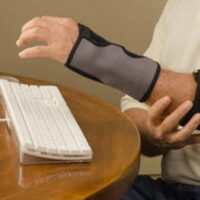Diagnosis And Treatment Issues In Repetitive Stress Injury Claims

Knee injuries and other joint injuries are among the most common workplace injuries. Many people are surprised to learn that white-collar workers are just as likely to sustain knee injuries as blue-collar workers. Frequently, a trauma injury, like falling or banging into an open file cabinet drawer, causes these injuries. Even more commonly, repetitive stress causes joint injuries. There is only so much sitting-standing, bending, kneeling, and other movements that the human knee can endure.
Even if a non-work or pre-existing condition contributed to the repetitive stress injury, a Florida repetitive motion injuries attorney can usually obtain full benefits for these victims. These benefits usually include lost wage replacement and medical bill payment. However, insurance companies do not simply give these benefits away. That’s especially true with regard to repetitive stress injuries which have complex diagnosis and treatment problems,
Diagnosis Issues
Early symptoms of knee and other repetitive stress injuries usually include stiffness and soreness. Most workers don’t associate such symptoms with a serious injury. Instead, they believe they need a little more rest. When rest does not ease the pain, they usually try other self-help measures, like ice packs. They only see doctors when these things have failed.
By that time, their repetitive stress injuries are more advanced and more difficult to treat. More on these treatment issues below.
More to the point, the delayed doctor visit could compromise the victim’s workers’ compensation claim. The claims deadline in these cases is usually no more than ten days or two weeks.
Fortunately, a variation of the delayed discovery rule usually applies in these situations. Victims do not need to file injury or workers’ compensation claims until they know the full extent of their injuries and they connect these injuries with the defendant’s wrongful conduct, or, in this case, their work environments.
Treatment Issues
A combination of surgery and physical therapy is usually the only way to address knee injuries and other repetitive stress injuries. These treatments usually mean thousands of dollars in medical bills. Additionally, these victims often miss a lot of work. Recovery from extensive knee, hip, or other joint surgery is usually several weeks at the minimum. Extensive physical therapy could last several more months.
Most injured victims can choose their own doctor and physical therapist in Florida. They do not even have to choose a provider’s name off a list. So, they get the care and attention they need, as opposed to the care and attention an insurance adjuster is willing to authorize.
Thanks to workers’ compensation and its no-fault benefits, these victims do not need to worry about paying regular bills or medical bills as they recover.
Long-term physical therapy, such as repetitive stress injury physical therapy, sometimes involves the MMI (Maximum Medical Improvement) rule. If victims are not fully healthy once they reach MMI, they are eligible for partial disability payments. These situations are quite normal. Following extensive surgery and physical therapy, at least some loss of function is usually inevitable.
Reach Out to a Compassionate Hillsborough County Attorney
Repetitive stress injury victims do not need to face these issues alone. For a free consultation with an experienced workers’ compensation lawyer in Tampa, contact Kobal Law. We do not charge upfront legal fees in these matters.
Resource:
ncbi.nlm.nih.gov/pmc/articles/PMC4553424/

